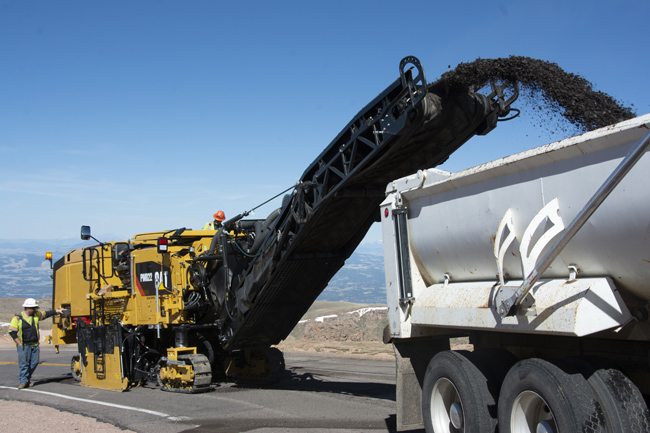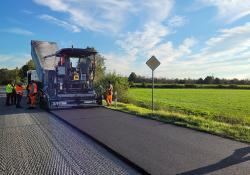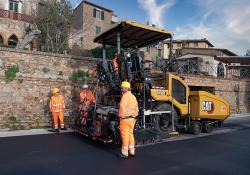
Working as a subcontractor for the Kiewit Corporation on the mill and overlay project, the Continental Milling crew was responsible for milling patches up to 213.4m long on the winding, two-lane highway known for its switchback turns and scenic vistas. The work was needed to prepare the route for the annual Pikes Peak International Hill Climb.
Pikes Peak Highway features some very steep grades, both cross slope and running slope. Chris Neeley, co-owner and program manager for Continental Milling said, “We have some areas that are exceeding 12% on a running slope with a cross slope close to eight percent on some of the switchback turns,” Neeley said.
The cold planer’s optional grade control provided precision control necessary to successfully mill the site’s steep grades. Continental Milling’s work ranged from edge milling to full depth 50.8mm cuts. Some of the patches were half-width, but the majority were the full width of the roadway.
“There’s high spots and low spots, so there’s areas where we’re cutting two inches and others where we’re cutting nothing,” said Raymond Trout, operations manager.
With the hill climb just three weeks after the mill and overlay, work was completed on a tight schedule. The Continental Milling crew had to mill approximately 3,344.5m2 of material in just two and a half days, with all work done at 4,078.2m and higher. “We had to work around traffic, and Kiewit was required to pave behind us as we opened up the patches,” Neeley said. “It was a challenge.”
A
“It performed above and beyond what our initial thoughts were with power loss at that elevation,” Neeley noted. “We needed to be efficient, and we needed to be productive.”
Work began at the last section of the 31km roadway, with the last patch completed where the asphalt ends at the summit. Transporting the equipment to the jobsite proved to be the greatest challenge. Tracking the cold planer up and down the mountain roadway took 22 hours. A lowboy trailer transporting the machine made it to an elevation of around 2743m, but was unable to negotiate the switchback turns beyond that point. The PM822 tracked the remaining 17.7km to reach the jobsite.
The Pikes Peak Highway mill and overlay is the highest profile job so far for Continental Milling.
The Pikes Peak Highway is a 31km road that enables vehicles to drive to the 4,302m summit of Pikes Peak. The mountain is located in Pike National Forest, 19km west of downtown Colorado Springs, Colorado. The road has a series of switchbacks, which are treacherous at high speed.
The Pikes Peak International Hill Climb, also known as the Race to the Clouds, is an annual automobile and motorcycle competition to the mountain’s summit. The 20km track on the Pikes Peak Highway traverses 156 turns, and climbs 1,440m from start to finish, while grades on the course average 7.2%.













